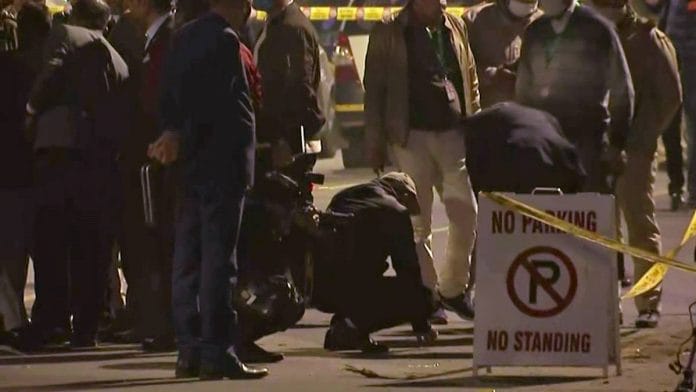New Delhi: The Delhi Police Special Cell suspects an “insider’s hand” in the low intensity blast reported from outside the Israeli Embassy Friday, ThePrint has learnt.
The police has made a list of the staff and security posted inside the embassy and will now be questioning them.
“The staff and security in the embassy are being questioned. It appears and is possible that someone from inside facilitated this blast,” a police source said.
“We have taken down details of who all were on leave across departments on Friday and are also checking registers to the timing of staff that left early. The CCTV footage of all the entry and exit gates is also being examined,” the source said.
On Friday night, the Special Cell received a call from a cab driver who said that he had dropped off two “suspicious looking” people near the embassy around the time of the blast. The security camera footage accessed by the police showed a cab near the embassy soon before the blast.
However, the input was later determined to be a false alarm as nothing concrete could be established on questioning the driver and the two passengers.
The blast took place when President Ram Nath Kovind, Vice President M Venkaiah Naidu and Prime Minister Narendra Modi were present a few kilometres away at the Beating Retreat ceremony at the culmination of the Republic Day celebrations. No one was injured in the explosion.
External Affairs Minister S. Jaishankar tweeted that embassy and Israeli diplomats would be give ‘fullest protection” and added that no effort was being spared to find the culprits.
In a video message, Israeli Ambassador Ron Malka said all diplomats and their families were safe, and noted that the incident coincided with the 29th anniversary of the establishment of diplomatic relations between the countries.
Letter, bomb shrapnel, CCTV footage recovered
Police recovered an unsigned letter from the blast site, the authenticity of which is still being checked.
According to police sources, the letter was in an envelope that was addressed to the Israeli ambassador, and stated that the explosion was just a “trailer”. It also referred to Iran’s General Qasem Soleimani and nuclear scientist Mohsen Fakhrizadeh, as “martyrs”. Both Iranians were killed in two separate incidents last year.
While Soleimani, a powerful military commander, was killed near Baghdad International Airport in a US airstrike on 3 January, Fakhrizadeh was shot in East Tehran. A Nissan truck beside his car also exploded. Iran blamed Israel and US for the assassination of Fakhrizadeh, and claimed an exiled opposition group used a satellite-controlled weapon to carry out the killing.
Police are also analysing CCTV footage recovered from over a dozen cameras in the area and from inside the embassy as well.
“A team is analysing the CCTV footage from various cameras. A list is being made of all the vehicles that passed through the area where the blast occurred and their details are being gathered from the respective RTOs,” a police source said.
According to the source, the bomb gave out shrapnel that appeared to be similar to ball bearings. The shrapnel was unidirectional, which means it could only damage vehicles in close proximity.
The improvised explosive device did not have a detonator and was more of a “crude bomb”, the source added.
“It appears that PETN was used in the bomb but a team of forensic experts have taken clues from ground to ascertain the chemical used in the bomb,” the source said.
Sources also said that the bomb was packed in a can of Thums Up.
Also read: Here’s the big exposé about India and Israel funding Pakistanis since 1947






